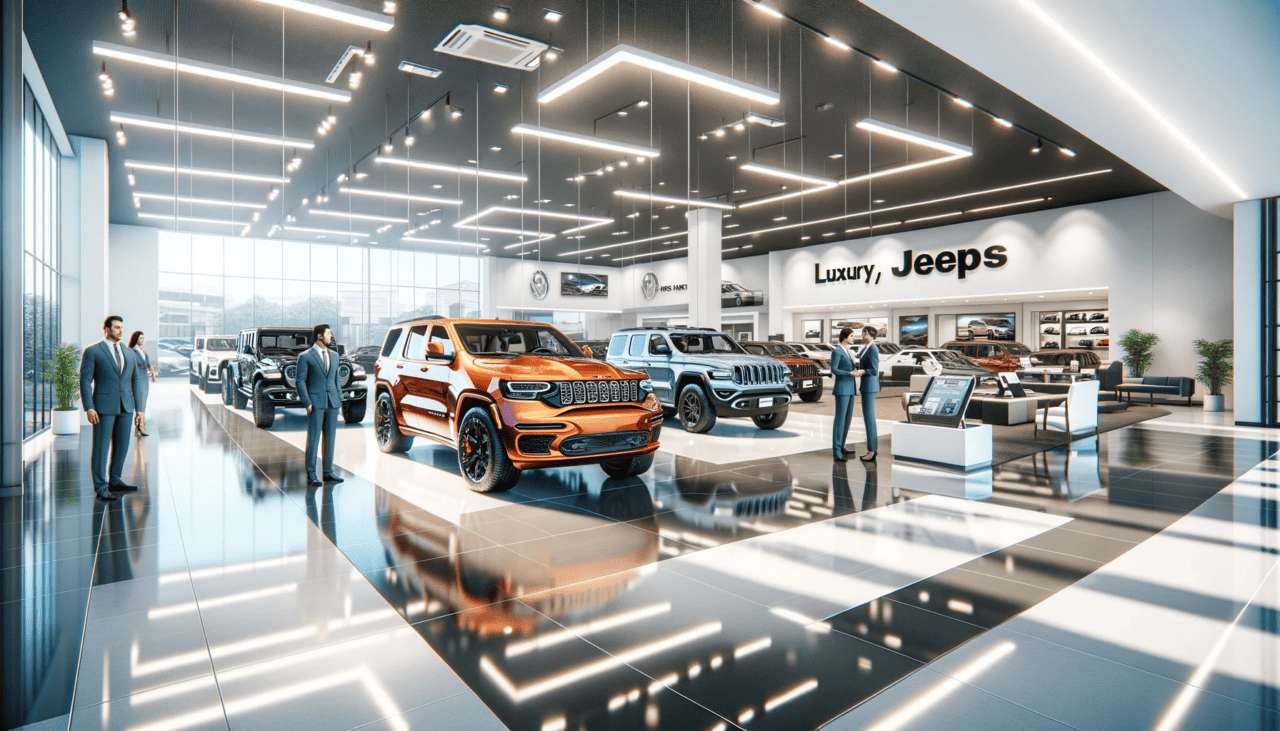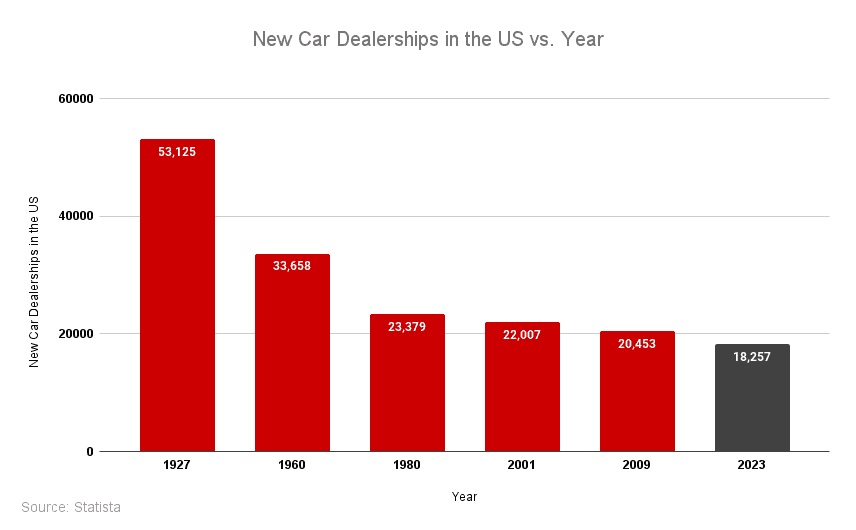Will car dealerships disappear?
Or, rather, do you want them to disappear? Plus, how did they become so essential?
It’s a question that’s becoming more common: will car dealerships disappear?

There’s a big if to start this article. If you don’t own a dealership, chances are you don’t like working with them. The sentiment around them is common (as this Subreddit’s name eloquently describes).

“Drive Past Myths: Get the Real Deal on Car Buying!”
🚘 Uncover 13 Car Buying Misconceptions with Our FREE Newsletter!
Plus you will get our quick tips, expert advice, and myth-busting insights delivered straight to your inbox.
Subscribe now and make informed decisions without the detours.
“Experts Hate This! Learn the Car Buying Secrets They Don’t Want You to Know. Free Subscription!”
While not all of us will hate them, we don’t like going to them, be it for buying a car or having it serviced. There’s a commonly held belief that they will rip us off, and, to be fair, evidence stacks against them, as this video explains.
That’s where EVs come into play. It’s not only that we will (likely) depend less on fossil fuels–it’s more complicated than that. The way we view car ownership could change.
Thus, the question arises: will car dealerships disappear?
Why the future of dealerships is uncertain
Car buying has evolved incredibly rapidly in recent times. You can now buy a car without even seeing it, thanks to the dramatic rise in virtual dealerships.
Then there are car subscriptions. As if lending and leasing a car weren’t complicated enough, this new business wedges them together and offers customers another way of buying a car.
This article explains vehicle subscriptions in more detail and makes a crucial comparison to help us understand the future of car buying: think of a car as a phone, and you get the idea.
Tesla plans to take this a step further, which has made the issue a bit more complicated. After all, how do you transfer car updates, upgrades, and software-based features that are non-transferable? This article dives into this odd and fascinating topic.
All these changes revolutionize how we buy cars and, at a distance, the traditional dealership holds on for dear life. So, should it be scared?
The reality is that, in the short run, dealerships will not disappear because they are too powerful and have laws protecting them.
Dealerships first appeared in 1889, and they made perfect sense. Automakers loved them from the start for several reasons. For example, the company only had to worry about producing cars, not selling them.
All they needed to do was wholesale a car fleet to the dealership and walk away with cash. That’s why, in the past, it was unthinkable to ask, “will car dealerships disappear?”
Also, they could easily regulate dealerships to operate in their conditions. It was a pact with the Devil, of sorts, as dealerships could make money but had to play by the rules.
It might make no sense from the outside, but there was a lot of money in it for dealerships, mainly because nobody else sold cars.
Dealerships blossomed during the 1910s and 20s, but then there was a tug-of-war between the manufacturers. It made more sense to have fewer dealerships but with higher quality. After all, as we explain, automakers made some of the rules.
So, the number of dealerships dwindled in exchange for quality and, most importantly, control.
The following image shows the number of dealerships over the years. However, that didn’t take away their power.

After all, over the years, dealerships have lobbied for laws and regulations that forbid automakers from selling cars. You can’t walk up to a Chevy factory and buy a car.
Car dealers have lobbied so heavily that many regulations are in place in all states. Simply put, automakers can’t sidestep any dealership.
This applies to selling and fixing cars, even claiming warranties. Dealerships became powerful, perhaps too powerful.
So much so that, as this article states, they are now the country’s most powerful middlemen.
With so much power, dealerships could upmarket any and all services, and buyers couldn’t change this. Not only that, but automakers also had to obey.
This article is academic but explains the complexity behind dealerships’ and automakers’ financial relationships.
But the reality is that our lives are changing. That’s why people wonder, “Will car dealerships disappear?”
We’re now more used to getting things directly from the manufacturer. In this Direct-To-Consumer world, dealerships began to lag behind, and they had earned a bad reputation.
Do dealerships rip you off?
The question is aggressive, but it’s a sentiment that many have. Plenty of articles teach you how to avoid a dealership scam.
This video explains some of the most common ways dealerships scam buyers.
And it’s not only about scams. The entire sales tactic is also under constant scrutiny, with traditional strategies that are ingrained that we assume it’s the only way.
This article by Consumer Reports taught me a lot about it. It also makes a strong case on why people ask “will car dealerships disappear?”
Let’s face it: buying a car can be overwhelming, especially when the dealer offers additional “bonuses” or charges, such as “spot delivery,” “packed payments,” and other aspects.
This feeling of hatred against dealerships worsened during the Pandemic. That’s when the dealership came under aggressive scrutiny, mainly because it behaved unlike anything we had seen before.
So much so that you could make a video about the situation and go viral, regardless of the topic.
(Upmarks were crazy; there are two ways about it).
This historic moment not only changed how we worked but also shed light on our dependency on dealerships. Did we need the dealership, or could there be another way?
We knew that they had become so powerful that even the FTC had to get involved.
Will car dealerships disappear?
So, will car dealerships disappear? Not quite.
The reality is that dealerships won’t disappear soon, but they will change how they work. Some dealerships are already implementing a no-haggle strategy. While this is a subtle change, it reflects our migration to a DTC mindset.
After all, you don’t haggle at an Apple store.
Not only that, but it also turns out that people really hate haggling, as this article explains.
But haggling is only one part of buying a car. Legally, dealerships are strong. That’s why Tesla hasn’t been able to implement DTC car sales.
So, it’s a battle of the old vs. the new. And who knows? Other brands like Toyota and Honda might look into the DTC model. However, I doubt it. These companies are so massive that introducing a new part to the vertical process is cost-prohibitive.
That’s where the secret lies. Some car companies (massive companies) aren’t interested in other parts of the car-selling process.
Instead, they rely on an industry that’s been established for over a century.
This industry will change to a digital platform. For us “older people”, it may sound strange: buying a car online, without even seeing it.
But, that’s how we buy everything now, including phones, computers, clothes and shoes. So, why not cars?
The problem with this is that, you’re buying a car!
Next to a house, it’s the most important investment you’ll make, and there’s a chance you get scammed.
This article explains how it works, and some of the pitfalls.
In the near future, we’ll see a balance of both. Some large, more traditional companies will continue to work with dealerships, and they might even assume a hybrid model.
I envision Toyota creating a different brand and selling it DTC.
Then, other companies, such as Tesla, Rivian, and Lucid, will target the DTC experience directly.
It’s a fascinating moment. When the first dealership appeared in 1898, it only sold motor vehicles. It shunned horse carriages.
Now, it’s the EV companies aiming at a new model. Who knows what will happen?
